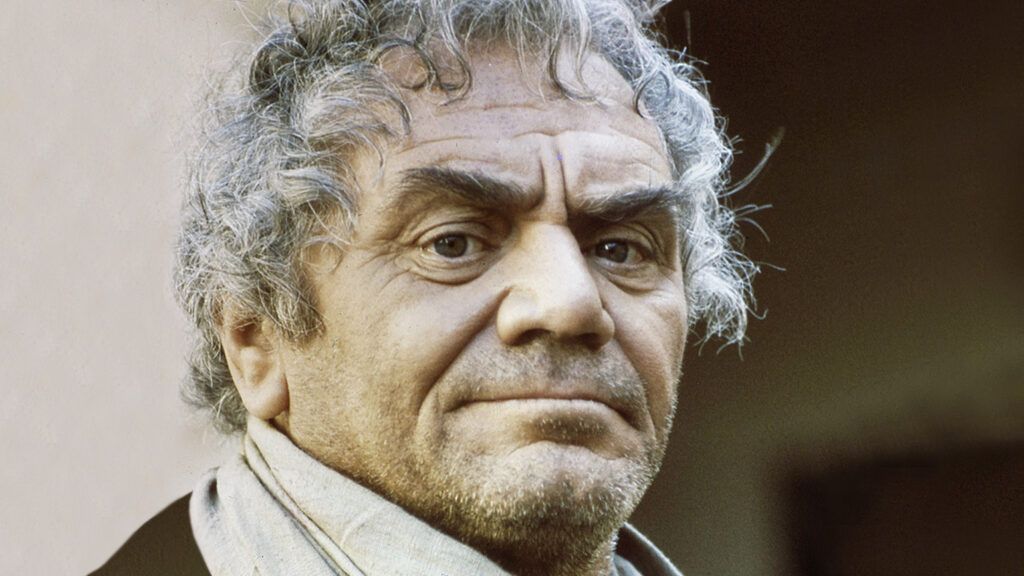Back in 1975 I was offered a part in the film Jesus of Nazareth, which through the years has been shown at Easter time on NBC television.
Our cast, directed by the renowned Franco Zeffirelli, included Anne Bancroft as Mary Magdalene, and Olivia Hussey as Mary, mother of Jesus. I played the part of the centurion who was present at the crucifixion, the one whose servant had been healed by Jesus.
Much of the film was shot in Tunisia on the Mediterranean during January and February of 1976. A cold, damp wind continually knocked over floodlights and stung us with desert sand.
I was uncomfortable in my thick leather uniform. My neck ached under a ponderous metal helmet, and I even began to pity those ancient Roman soldiers who were called centurions because they commanded 100 men.
When it came time for my scene during the crucifixion, the weather was chill and gray. The camera was to be focused on me at the foot of the cross, and so it was not necessary for Robert Powell, the actor who portrayed Jesus, to be there.
Instead, Zeffirelli put a chalk mark on a piece of scenery beside the cameraman. “I want you to look up at that mark,” he told me, “as if you were looking at Jesus.”
“Okay,” I said, moving into position and looking up at the mark as instructed.
“Ready?”
I hesitated. Somehow I wasn’t ready. I was uneasy.
“Do you think it would be possible for somebody to read from the Bible the words Jesus said as He hung on the cross?” I asked.
I knew the words well from the days of my childhood in an Italian-American family in Connecticut, and I’d read them in preparation for the film. Even so, I wanted to hear them now.
“I will do it myself,” Zeffirelli said. He found a Bible, opened it to the book of Luke and signaled for the camera to start rolling.
As Zeffirelli began reading Christ’s words aloud, I stared up at that chalk mark, thinking what might have gone through the centurion’s mind.
That poor Man up there, I thought. I met Him when He healed my servant, who is like a son to me. Jesus says He is the Son of God, an unfortunate claim during these perilous times. But I know He is innocent of any crime.
“Father, forgive them; for they know not what they do.” The voice was Zeffirelli’s, but the words burned into me—the words of Jesus.
Forgive me, Father, for even being here, was the centurion’s prayer that formed in my thoughts. I am so ashamed, so ashamed.
“Verily I say unto thee, today shalt thou be with me in paradise,” said Jesus to the thief hanging next to Him.
If Jesus can forgive that criminal, then He will forgive me, I thought. I will lay down my sword and retire to my little farm outside of Rome.
Then it happened.
As I stared upward, instead of the chalk mark, I suddenly saw the face of Jesus Christ, lifelike and clear. It was not the features of Robert Powell I was used to seeing, but the most beautiful, gentle visage I have ever known.
Pain-seared, sweat-stained, with blood flowing down from thorns pressed deep, His face was still filled with compassion. He looked down at me through tragic, sorrowful eyes with an expression of love beyond description.
Then His cry rose against the desert wind. Not the voice of Zeffirelli, reading from the Bible, but the voice of Jesus Himself: “Father, into Thy hands I commend My spirit.”
In awe I watched Jesus’ head slump to one side. I knew He was dead. A terrible grief welled within me, and completely oblivious to the camera, I started sobbing uncontrollably.
“Cut!” yelled Zeffirelli. Olivia Hussey and Anne Bancroft were crying too. I wiped my eyes and looked up again to where I had seen Jesus—He was gone.
Whether I saw a vision of Jesus that windswept day or whether it was only something in my mind, I do not know. It doesn’t matter. For I do know that it was a profound spiritual experience and that I have not been quite the same person since.
I believe that I take my faith more seriously. I like to think that I’m more forgiving than I used to be. As that centurion learned 2,000 years ago, I too have found that you simply cannot come close to Jesus without being changed.
* * *
Faith and prayer have been a part of Ernest Borgnine’s life ever since he was a boy growing up in Connecticut.
His grandmother taught him a little prayer in Italian that began with the words Signore, ti ringrazio per il giorno che mi hai datto (Lord, I thank You for the day You have given me), which he repeated every morning and evening.
Prayer continued to be part of his life—during 10 years in the U.S. Navy (which included serving as a gunner’s mate in World War II), and in the postwar years as he labored in warehouses, attended acting school and appeared in plays and television dramas.
It was especially important to him during a lonely moment in 1951 when he was desperate for work. He’d heard that a film company was casting, so he showed up for a screen test.
But there were 40 people ahead of him, and so the casting director said, “Go and lose yourself for a couple of hours.”
With only 15 cents in his pocket, he walked down Fifth Avenue and came to St. Patrick’s Cathedral. He climbed the wide stone steps and sank down in a back pew. “Please, Father,” he prayed, “I need the work. If You can possibly help me, I would appreciate it very much.”
He got the part. It was Ernest Borgnine’s first movie, The Whistle at Eaton Falls. That launched him on a career that saw him play the part of villainous Fatso Judson in From Here to Eternity and the lovable hero in Marty, for which he won an Academy Award in 1956.
Borgnine has never forgotten the prayer his grandmother taught him. It has stayed with him. Over the years, he has added to it prayer for those close to him.
And today he continues to maintain the daily routine of morning and evening prayers from which he says he feels refreshed and derives a sense of inner peace.
For more inspiring stories, subscribe to Guideposts magazine.





